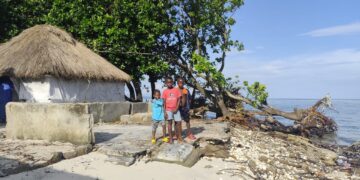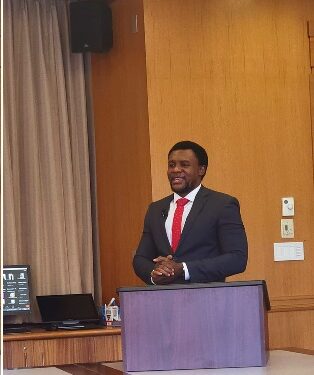By Dr. Emmanuel A.M. Sam, BCBA, LABA, Esq.
Extradition treaties are legal instruments based on sovereignty, reciprocity, dual criminality, and mutual legal assistance. They ensure the orderly transfer of individuals accused or convicted of crimes between states while respecting international law, human rights, and diplomatic relations. Key principles, including state sovereignty, mutual cooperation, and reciprocity, form the legal basis for an extradition treaty under international law and diplomacy.
According to international law, every state has the sovereignty to decide whether or not to enter into an extradition agreement with another country. Thus, the decision to cooperate on extradition is voluntary and based on mutual consent, typically formalized through treaties or bilateral agreements. This is because extradition treaties serve as binding agreements that provide the legal framework for the process, ensuring that both parties agree on the scope of extraditable crimes, the extradition process, and the rights of the individuals involved. Extradition is often based on reciprocity, meaning states agree to extradite individuals for similar offenses to each other. Thus, the extradition of a fugitive is typically a two-way commitment, where each country is bound to reciprocate the other’s request for surrender, provided certain conditions are met.
Dual criminality is a key principle in extradition. This means that the act for which extradition is requested must be a crime in both the requesting and requested states. However, extradition may be denied if the alleged offense is not recognized as a crime in the requested country. One key point to note is that international law fully acknowledges the non-extradition of political offenders. However, it generally prohibits extradition for political offenses (e.g., dissent against the government, political activism, or acts related to national liberation). Treaties often stipulate this to avoid the misuse of extradition for political persecution.

In Sierra Leone, for example, the Extradition Act of 1974 remains a cornerstone of the legal framework for the extradition of criminal suspects to and from the country. As international crime and cooperation evolve, the Act provides a structured approach to handling requests from foreign governments while ensuring the protection of fundamental rights. The Act defines a “fugitive criminal” as any person accused or convicted of an extraditable offense who has fled from the jurisdiction of a requesting state. According to Section 3, “Every fugitive criminal is liable to be apprehended and extradited in the manner provided in this Act.”
The procedure for extradition in Sierra Leone is straightforward and uncomplicated. Extradition requests must be addressed to the attorney general through diplomatic channels. Section 6 states, “A request for the surrender of a fugitive criminal of any country shall be made to the Attorney General by a diplomatic representative of that country.” Upon receiving such a request, the Attorney General determines its validity before initiating legal proceedings. As discussed above, one of the fundamental principles of the Act is dual criminality, meaning that the offense in question must be recognized as a crime in both Sierra Leone and the requesting country. The law also stipulates that extradition shall not be granted for politically motivated charges. Section 10(1) clearly states, “Extradition shall not be granted if the offense is of a political character or if the request is made for the purpose of prosecuting or punishing a person on account of his race, religion, nationality, or political opinions.” This safeguard ensures that the law is not used as a tool for persecution.
One of the beauties of the Sierra Leone Extradition Act of 1974 is that it makes special considerations for Commonwealth nations, similar to how the Dutch Extradition Act of 1886 does for European nations. Sierra Leone’s legal system has historical ties with Commonwealth countries, and the Extradition Act includes specific provisions to facilitate extradition among these nations. Section 15 states, “Special conditions, limitations, and modifications shall apply to requests made by Commonwealth countries as listed in the First Schedule.” A unique legal arrangement exists between Sierra Leone and the Republic of Guinea. Under Part III, requests for extradition from Guinea are governed by a distinct set of conditions, ensuring alignment between the judicial systems of the two nations.
According to Reuters, in early February 2025, the Dutch government formally requested the extradition of Jos Leijdekkers, a convicted drug trafficker believed to be residing in Sierra Leone. Dutch Justice Minister David van Weel announced the submission of the extradition request, expressing hope for swift cooperation from Sierra Leonean authorities in combating international organized crime. Leijdekkers, considered one of Europe’s most wanted fugitives, was sentenced in absentia by a Rotterdam court to 24 years in prison for smuggling over seven tons of cocaine. From reports that I have read from different international tabloids, which I cannot ascertain the veracity of, Jos Leijdekkers has been in Sierra Leone since early 2023, and the Dutch government wants him back home to do his sentence.
This current standoff between the two countries has profound legal implications that require careful analysis. Approaching this issue from a legal perspective rather than a political one involves significant complexities. When two countries lack an extradition treaty, as is the case between Sierra Leone and the Netherlands, extradition becomes more complicated and encounters various legal, political, and diplomatic hurdles. In the context of Sierra Leone and the Netherlands, here are the key issues they may face in the extradition process of Jos Leijdekkers.
The two countries face legal limitations in effectively carrying out extradition. Without a formal extradition treaty, Sierra Leone is not legally obligated to extradite Jos Leijdekkers. The Extradition Act of 1974 in Sierra Leone may only allow extradition under specific circumstances or to particular countries, such as Commonwealth nations and the Republic of Guinea. The two countries might prefer to use diplomatic channels rather than pursue legal avenues to resolve the dilemma. Extradition must be negotiated case by case, requiring high-level diplomatic engagement from both governments. Sierra Leone may need diplomatic assurances concerning Leijdekkers’ treatment, trial, and imprisonment, which can mean anything and everything.
Sierra Leone’s courts may lack the jurisdiction to approve an extradition request outside the Extradition Act’s scope. The attorney general or the president might need to authorize a distinct process for extradition, which could face legal challenges. Furthermore, deportation or expulsion may be another option the Dutch government could ask Sierra Leone to pursue. However, a sovereign government cannot be compelled to deport anyone against its will. If extradition is not legally feasible, Sierra Leone might deport Leijdekkers for visa or immigration infractions. Conversely, if extradition fails, Sierra Leone could prosecute Leijdekkers locally for crimes committed within its jurisdiction.
Without a treaty, extradition is uncertain and politically sensitive. Sierra Leone may demand strong diplomatic incentives, and the Netherlands may need to navigate legal loopholes to secure the fugitive’s surrender. If no agreement is reached, alternative measures such as deportation or a local trial might be the best option. If Leijdekkers is in Sierra Leone illegally or under fraudulent documents, the government could deport him instead of formal extradition. This would be a swifter process and avoid the legal complexities of extradition.
Many people have requested a swap deal between the Sierra Leone government and the Dutch government. They have also asked Sierra Leone to request that the Dutch government turn over Abdul Will Kamara (Adebayor). This could only be achieved through political and diplomatic will, but it seems legally impossible. International law generally prohibits extradition for political offenses, especially when a person has differing opinions about a government’s operations and dealings and claims an activist role. The 1974 Extradition Act of Sierra Leone states in Section 10(1): “Extradition shall not be granted if the request is made for the purpose of prosecuting or punishing a person on account of his race, religion, nationality, or political opinions.” This provision may deter the Dutch government from turning over Adebayor. Under the Dutch Extradition Act (Uitleveringswet, 1886, amended), the Minister of Justice and Security makes the final extradition decisions after court approval. Under this framework, EU countries do not require diplomatic negotiations to extradite suspects. Unfortunately, Sierra Leone is not a member state of the EU. Therefore, they must go through all the legal intricacies to extradite Adebayor.
The Dutch Extradition Act balances international cooperation with fundamental human rights protections. By incorporating provisions such as dual criminality, protection against political persecution, and human rights safeguards, the Act ensures that extradition procedures comply with the rule of law while preventing abuses amid increasing cross-border crime and international legal cooperation. When an extradition request is submitted, the District Court of The Hague reviews the request to assess its compliance with legal and human rights standards. If the court approves the extradition, the final decision rests with the Minister of Justice and Security, who can approve or deny extradition based on diplomatic or policy considerations. Therefore, obtaining Adebayor could present more complications than anticipated, given the strict human rights standards the Dutch government imposes on extradition.
Another area that the two countries might explore is mutual interest. This became evident years ago with the United States, Russia, China, and Taiwan. The U.S. requested the extradition of Edward Snowden, who was granted asylum in Russia after leaking classified NSA documents in 2013. In turn, Russia sought the extradition of Russian nationals charged with crimes in the U.S., including arms dealer Viktor Bout, who was exchanged in 2022 for American basketball player Brittney Griner. Rather than formal extradition, the two countries have occasionally used prisoner swaps or diplomatic negotiations to address such cases. However, advancing the argument of fugitive status in Adebayor’s case could be somewhat challenging for the Dutch government to consider.
The Sierra Leone government may contemplate the utilization of Mutual Legal Assistance (MLA) as a potential mechanism for securing Adebayor. MLA is a crucial component of international collaboration to combat cross-border crime, enabling law enforcement agencies to cooperate effectively in addressing complex criminal activities that transcend multiple jurisdictions. Nevertheless, implementing MLA is not without challenges; disparities in legal systems, political considerations, and privacy concerns must be navigated with particular care. Although a formal extradition treaty is lacking, Sierra Leone and the Netherlands could leverage Mutual Legal Assistance Agreements (MLAAs) within established international cooperation frameworks. However, the Dutch government would likely seek assurances regarding the extradition of Adebayor, particularly if he holds Dutch citizenship.
In conclusion, the extradition situation between Sierra Leone and the Netherlands highlights the complexities of international legal cooperation without a formal treaty. Although the outcome is uncertain, Sierra Leone might consider extraditing Jos Leijdekkers based on diplomatic negotiations and legal factors. Alternatives like deportation or local prosecution may be explored. The extradition of Abdul Will Kamara (Adebayor) is unlikely due to prohibitions against extradition for political offenses in both countries and the Dutch emphasis on human rights. Mutual Legal Assistance (MLA) could facilitate cooperation but faces legal and political challenges. The case underscores international law enforcement’s difficulties concerning sovereignty, human rights, and legal obligations in a globalized context.
Dr. Emmanuel A.M. Sam is an esteemed international law scholar with expertise in human rights, environmental law, and corporate and compliance law. He teaches in the Faculty of Law at Fourah Bay College, University of Sierra Leone, and is a fellow at Sweden’s Raoul Wallenberg Institute of Human Rights and Humanitarian Law. A prolific academic, Dr. Sam has authored and co-authored books and published extensively in peer-reviewed journals, making significant contributions to legal scholarship and policy development.

























